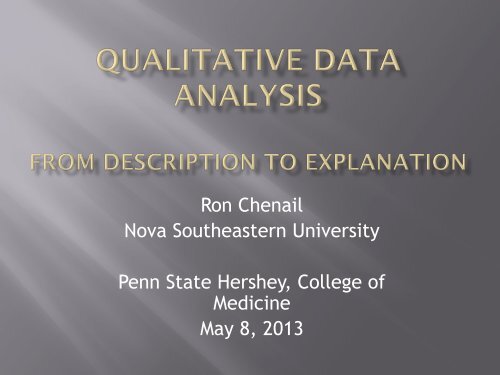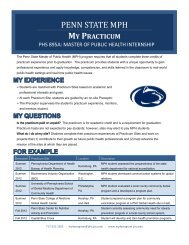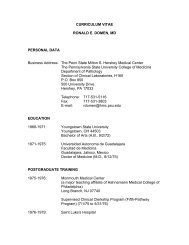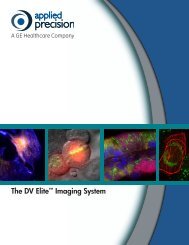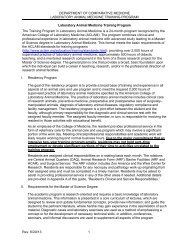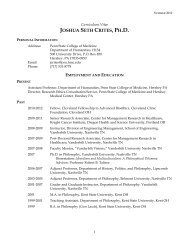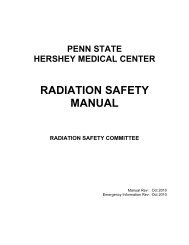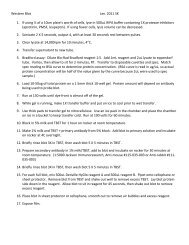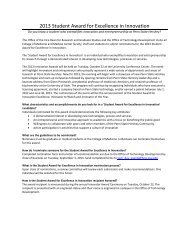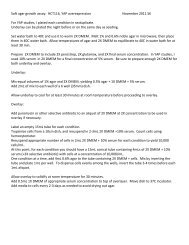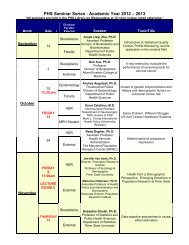Qualitative Data Analysis Description to Explanation
Qualitative Data Analysis Description to Explanation
Qualitative Data Analysis Description to Explanation
- No tags were found...
Create successful ePaper yourself
Turn your PDF publications into a flip-book with our unique Google optimized e-Paper software.
¨ Presenting one or more concepts or themeseither developed in situ from the data orimported from existing theories or literatureoutside the study¨ Moving <strong>to</strong>wards interpretively integratingportions of data¨ Extending the theoretical or other intellectualtradition from which they were imported and/or illuminating an experience(Sandelowski & Barroso, 2003, pp. 913-914)
¨ Transforming data <strong>to</strong> produce groundedtheories, ethnographies, or otherwise fullyintegrated explanations of some phenomenon,event, or case¨ Clarifying or elucidating conceptual orthematic linkages that re-present the targetphenomenon in a new way¨ Attending <strong>to</strong> relevant variations in both sampleand data (Sandelowski & Barroso, 2003, p. 914)
¨Generic Design is whenresearchers use genericor “eclectic” qualitativemethods (e.g., opencoding, axial coding,constant comparison) <strong>to</strong>produce conceptualcategories and themes.¨Designer Design iswhen researchers followdesigner or “namebrand” methodologies<strong>to</strong> produce the mosttransformed results andfindings (e.g., thickdescriptions, groundedtheories, essences oflived experience).
¨ Philosophical origins¨ “The act of thinking about things, persons, oroccurrences”¨ The essence of lived experiences: the How andthe What¨ Distinguishing Features¡ Sensitivity and Literary¡ Long interviews¡ Horizons¡ Facticity and Meaning
¨ European and American¨ Classical (Husserl): Essence of consciousness¨ Existential (Heidegger): Dasein or Being-in-theworld¨ Hermeneutic (Gadamer): Interpretivestructures of experience of texts¨ Empirical Phenomenology (Giorgi):<strong>Description</strong>s of the co-researcher¨ Interpretive Phenomenological <strong>Analysis</strong> (IPA:Smith): Double Hermeneutic
¨ Studying people’s experiences¨ Studying how people make meaning in theirlives¨ Study relationship between what happenedand how people have come <strong>to</strong> understandthese events¨ Interested in people clarifying their essences
¨ Select au<strong>to</strong>biographical <strong>to</strong>pic¨ Select co-researchers¨ Inform co-researchers of <strong>to</strong>pic and procedures¨ Develop question/<strong>to</strong>pic guide¨ Conduct bracketed interview(s)¨ Prepare data for analysisMoustakas, 1994, 103-119
FactsLivedExperienceMeaning
¨ Epoché¨ Phenomenological Reduction¡ Bracketing¡ Horizontalization¡ Delimited Horizons¡ Invariant Qualities and Themes¡ Individual Textual <strong>Description</strong>s¡ Composite Textual <strong>Description</strong>s (Moustakas, 1994, p. 180)
¨ Imaginative Variation¡ Vary Possible Meanings¡ Develop Structural Themes¡ Individual Structural <strong>Description</strong>s¡ Composite Structural <strong>Description</strong>s¨ Synthesis of Composite Textual and CompositeStructural <strong>Description</strong>s¨ Member Checking and Peer Debriefing (Moustakas,1994, pp. 180-181)
OpenQuestionsBracketingFollow UpQuestionsLongInterview
HorizonHorizonHorizonInvariant Horizons or Constituents(Unique Qualities of an Experience)
ThemeThemeThemeConstituent(Quotes)Constituent(Quotes)Constituent(Quotes)Constituent(Quotes)Constituent(Quotes)Constituent(Quotes)
Textual<strong>Description</strong>sImaginativevariationStructural<strong>Description</strong>
TextualStructuralEssence
¨ Finlay, L. (2011). Phenomenology for therapists:Researching the lived world. Malden, MA: Wiley-Blackwell.¨ Giorgi, A. (2009). The descriptivephenomenological method in psychology: A modifiedHusserlian approach. Pittsburgh, PA: DuquesneUniversity Press.¨ Moustakas, C. (1990). Heuristic research: Design,methodology, and applications. Newbury Park:CA: Sage.
¨ Moustakas, C. (1994). Phenomenological researchmethods. Thousand Oaks, CA: Sage.¨ Pollio, H. R., Henley, T. B., & Thompson, C. J.(1997). The phenomenology of everyday life. NewYork, NY: Cambridge University Press.¨ Smith, J. A., Flowers, P., & Larkin, M. (2009).Interpretive phenomenological analysis: Theory,method, and research. London: Sage.
¨ Van Manen, M. (1990). Researching livedexperience: Human science for an action sensitivepedagogy. Albany, NY: The State University ofNew York.¨ Zichi Cohen, M., Kahn, D. L., & Steeves, R. H.(2000). Hermeneutic phenomenological research: Apractical guide for nurse researchers. ThousandOaks, CA: Sage.
¨ Sociological origins¨ “Creating theory from the ground up”¨ Constructing or discovering theory from data¨ Distinguishing Features¡ Inductive and Deductive Processes¡ Substantive and Formal Theory
¨ Glassarian or Classical (Barney Glasser andAnselm Strauss)¨ Straussian (Anselm Strauss and Juliet Corbin)¨ Constructivist (Kathy Charmaz)¨ Situational <strong>Analysis</strong> (Post-modern; AdeleClark)
¨ When you want <strong>to</strong> build/discover theoryinductively¨ When you want <strong>to</strong> build/discover substantiveand/or formal theory¨ When there is little or no prior information onan area or phenomenon¨ When you want <strong>to</strong> study the microcosm ofinteraction
¨ Open, Axial, and Theoretical Coding¨ In vivo Codes and Imported Codes¨ Theoretical Coding and Sampling¨ Constant Comparative Method¨ Conceptualization and Open Coding¨ Categorization and Axial Coding¨ Explana<strong>to</strong>ry Variables and Theoretical Coding¨ Theoretical Memoing
TheoreticalAxialOpen
Theoretical CodingTheoryAxial CodingThemesOpen CodingVariablesCategoriesConcepts
¨ Generic <strong>Qualitative</strong> Research¡ Utilizes Grounded Theory techniques <strong>to</strong> producecategories or themes¡ Does not transform findings <strong>to</strong> produce theory¡ Does not use theoretical sampling¨ Grounded Theory¡ Utilizes Grounded Theory techniques <strong>to</strong> produce atheory
¨Over the last 20 years, there have been a significant number of published studies inwhich the experiences of clients in marriage and family therapy have beeninvestigated <strong>to</strong> discover what works in therapy from their points of view.¨Although there have been a number of systematic reviews of the effectivenessliterature in marriage and family therapy and of clients’ experiences in individualcounseling, there has not been a comparable review of the research literaturepresenting clients’ experiences of their conjoint clinical treatment as couples orfamilies.¨To address this gap, the investiga<strong>to</strong>rs conducted a systematic review of publishedqualitative research studies in which data were collected from clients <strong>to</strong> learn abouttheir experiences within couple and family therapy and with their therapists.¨Specifically, the investiga<strong>to</strong>rs conducted a qualitative metasynthesis on studiespublished from 1990 <strong>to</strong> 2010 in which the researchers attempted <strong>to</strong> discover theexperiences of clients participating in conjoint couple and family therapy. Our goalwas <strong>to</strong> inductively construct a coherent grounded formal theory of clientexperiences of couple and family therapy. (Chenail et al., 2012)
¨ Chenail, R. J., St. George, S., Wulff, D., Duffy,M., Wilson Scott, K., & Tomm, K. (2012).Clients’ relational conceptions of conjointcouple and family therapy quality: A groundedformal theory. Journal of Marital and FamilyTherapy, 38(1), 241-264. doi: 10.1111/j.1752-0606.2011.00246.x
¨ Birks, M., & Mills, J. (2011). Grounded theory: Apractical guide. London: Sage.¨ Charmaz, K. (2006). Constructing groundedtheory: A practical guide through qualitativeanalysis. Thousand Oaks, CA: Sage.¨ Charmaz, K., & Bryant, A. (2007). The SAGEhandbook of grounded theory. Thousand Oaks,CA: Sage.
¨ Clarke, A. E. (2005). Situational analysis:Grounded theory after the postmodern turn.Thousand Oaks, CA: Sage.¨ Corbin, J., & Strauss, A. (2007). Basics ofqualitative research: Techniques and procedures fordeveloping grounded theory (3rd ed.). ThousandOaks, CA: Sage.
¨ Glaser, B. G., & Strauss, A. L. (1967). Thediscovery of grounded theory: Strategies forqualitative research. Chicago, IL: Aldine.¨ Morse, J. M., Stern, P. N., Corbin, J., Bowers, B.,Charmaz, K., & Clarke, A. E. (2009). Developinggrounded theory: The second generation. WalnutCreek, CA: Left Coast.
¨ Online QDA:http://onlineqda.hud.ac.uk/index.php¨ The <strong>Qualitative</strong> Report:http://www.nova.edu/ssss/QR/¨ Graduate Certificate in <strong>Qualitative</strong> Researchhttp://www.nova.edu/ssss/QR/¨ Email me: ron@nova.edu
Patricia L. Munhall&Ronald J. ChenailJones and Bartlett2008
Ronald J. Chenail, PhD, is Professor of FamilyTherapy in theSchool of Humanities and Social Sciences at NovaSoutheastern University in Fort Lauderdale,Florida. From 2005 <strong>to</strong> 2011, he was the Edi<strong>to</strong>r-in-Chief of the Journal of Marital and Family Therapy,the flagship research journal of the AmericanAssociation for Marriage and Family Therapy.Since 1990, he is also the founding Edi<strong>to</strong>r-in-Chiefof The <strong>Qualitative</strong> Report, the world's first online,open access, transdisciplinary journal dedicated <strong>to</strong>qualitative research. He may be contacted atron@nova.edu


